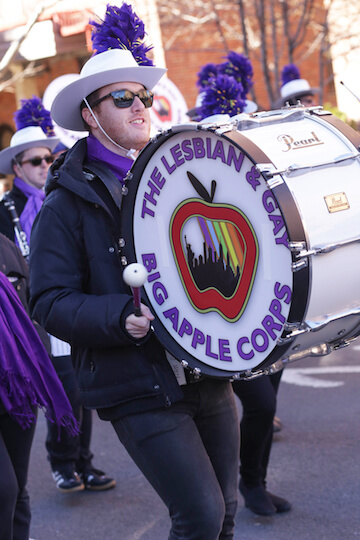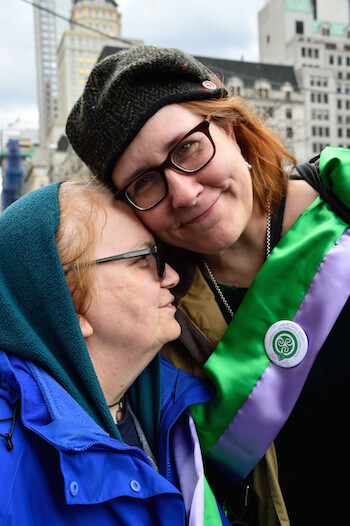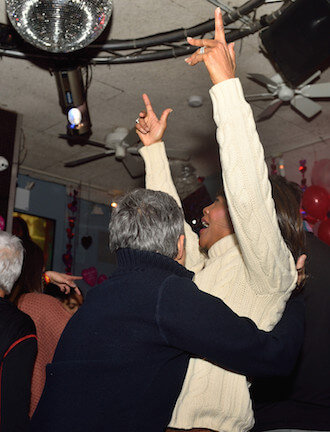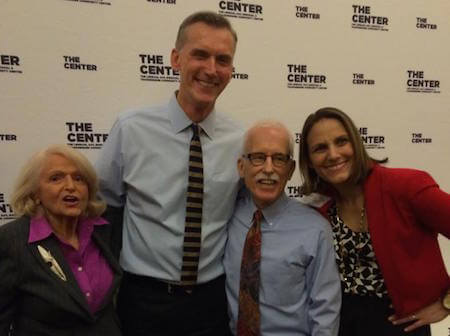President Barack Obama, in remarks in the White House Rose Garden, June 26, 2015. | ILLUSTRATION BY MICHAEL SHIREY
BY PAUL SCHINDLER | Comforted by the insight that even a broken clock is right twice a day, I’ve chosen a quote from Richard Nixon to frame my thoughts about the contributions one member of the LGBT community made to the successful fight for marriage equality. Our 37th president was not known for inspiring the better angels of our nature, but in describing the optimism that animates the American spirit as “the lift of a driving dream” in his 1970 State of the Union Address, Nixon captured a beautiful image.
I also think that the subject of this editorial will appreciate some sly humor in my looting Nixon rather than, say, Abe Lincoln in coming up with a headline.
In focusing on one person’s contributions, I don't in any way intend to dismiss or slight the enormous efforts on the part of tens of thousands of citizen activists and professional advocates. A Minnesota couple took the issue all the way to the Supreme Court in the early 1970s. Several thousand couples wed outside the IRS building during the 1987 March on Washington. Private attorneys apart from the LGBT movement identified litigation opportunities in Hawaii in the early 1990s. Movement lawyers, in turn, correctly weighed the prospects for early success in Vermont, Massachusetts, and Iowa — but they were also willing to take on a case in New York, despite a much bleaker judicial terrain. Advocates rallied to defend the victory in Massachusetts and to turn the New York court defeat into a win in the Legislature. One group of lawyers battled to victory in California — and a different set took on Proposition 8 which undid that win. Married couples and one formidable widow went after the Defense of Marriage Act, and based on that victory, court after court across the nation decided it was time to settle the whole business.
All of these efforts — and many more — were consequential and must be counted in any thorough and fair reckoning of how we got to this day. And I’m sure that Evan Wolfson, the founder of Freedom to Marry, would be the first to warn that I risk trivializing a long struggle and history itself in focusing on the role of one person. But I focus on Wolfson because his 32-year commitment to the marriage fight demonstrates beautifully how unbending fidelity to an idea, a goal, a cause can triumph.
As a Harvard Law student in the 1980s, Wolfson wrote his thesis on the legal, political, and social framework for achieving marriage equality — undoubtedly one of the least marketable topics among his classmates. Later, at Lambda Legal, he led one side of a contentious, even bitter debate about whether marriage should be a goal of the gay rights movement. It was at his urging that Lambda dove into the Hawaii litigation, the striking promise of which led the state’s voters to pull the plug — and national politicians to conclude that “traditional” marriage needed to be “defended” in federal legislation.
Wolfson never looked simply to the courts, ever aware that gays and lesbians needed to make their case to their fellow Americans, not only in the political arena but in their personal lives as well. In a 1997 interview at his Lambda office, where he sat in front of a portrait of the Great Emancipator, he described the slog toward marriage equality as a “long engagement.” I had first encountered Wolfson several years earlier — before I began working as a journalist — at a gathering of LGBT activists upstate. The organizer of the event, which was convened to discuss the languishing state gay rights bill (it would be another eight years before that prevailed in Albany), told me that marriage was “off-topic,” but “you can’t say no to Evan Wolfson.” When I heard his brilliantly cogent and compelling presentation, I understood why.
By 2003, Wolfson had stepped out of his role leading the marriage project at Lambda to found Freedom to Marry, giving himself a perch from which he became something of the battle’s quarterback — or, perhaps, third base coach. He always played to win, so I know some good number of people must have felt the sting of his relentless drive. Between my first encounter with him and my decision to schedule that 1997 interview with him at Lambda, I found myself on the receiving end of a finger-wagging lecture about how LGNY, Gay City News’ predecessor, was dropping the ball in its coverage of the fight. Wolfson often lauds the work of grassroots activists, but I know of more than one who resented what they sometimes felt was a heavy hand from on high.
But change isn’t easy — and, cast against the long history of what social justice movements in the US have encountered, what marriage equality advocates achieved is nothing short of phenomenal. I hope that some of the many, many others who contributed in so many ways to this victory understand the deep respect and appreciation I have for the work they did. But when an individual of singular talents devotes the bulk of their adult life to achieving a driving dream, I don’t think that contribution can go unremarked.


































